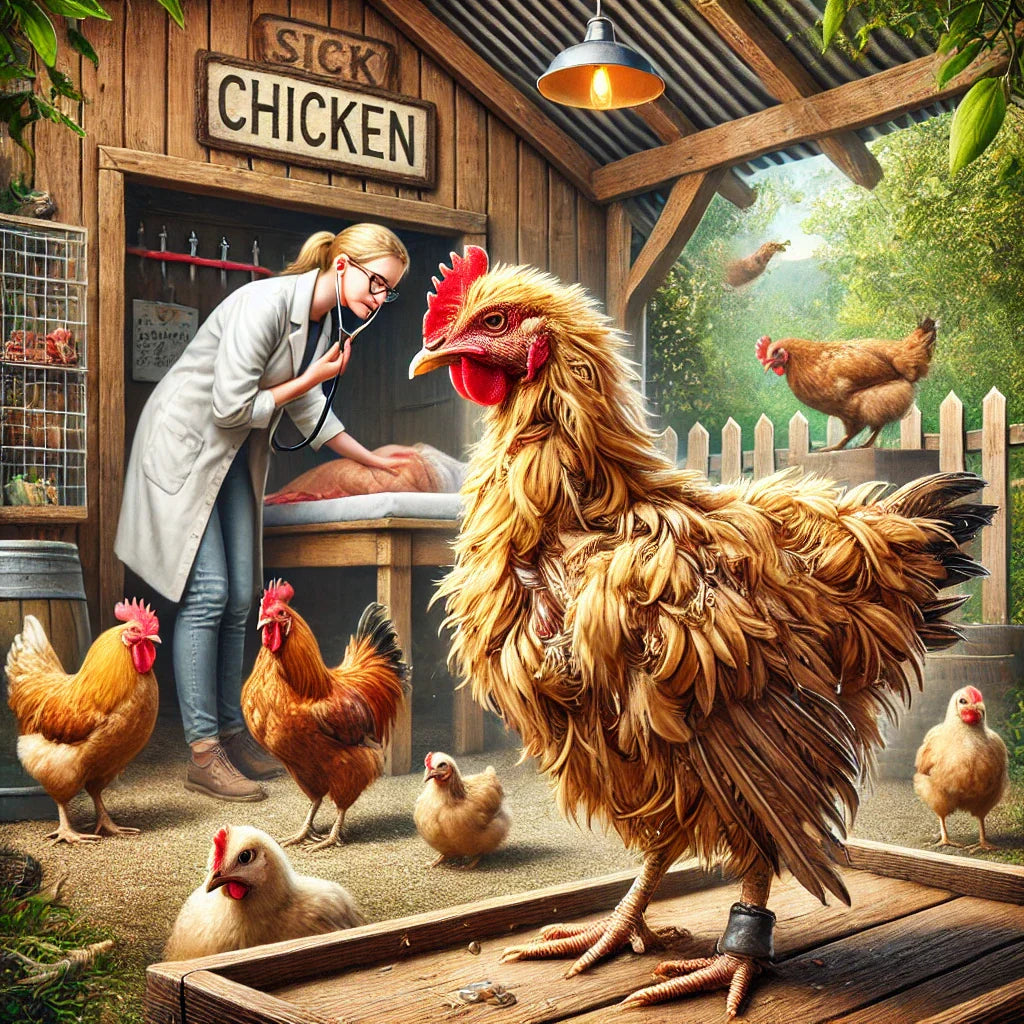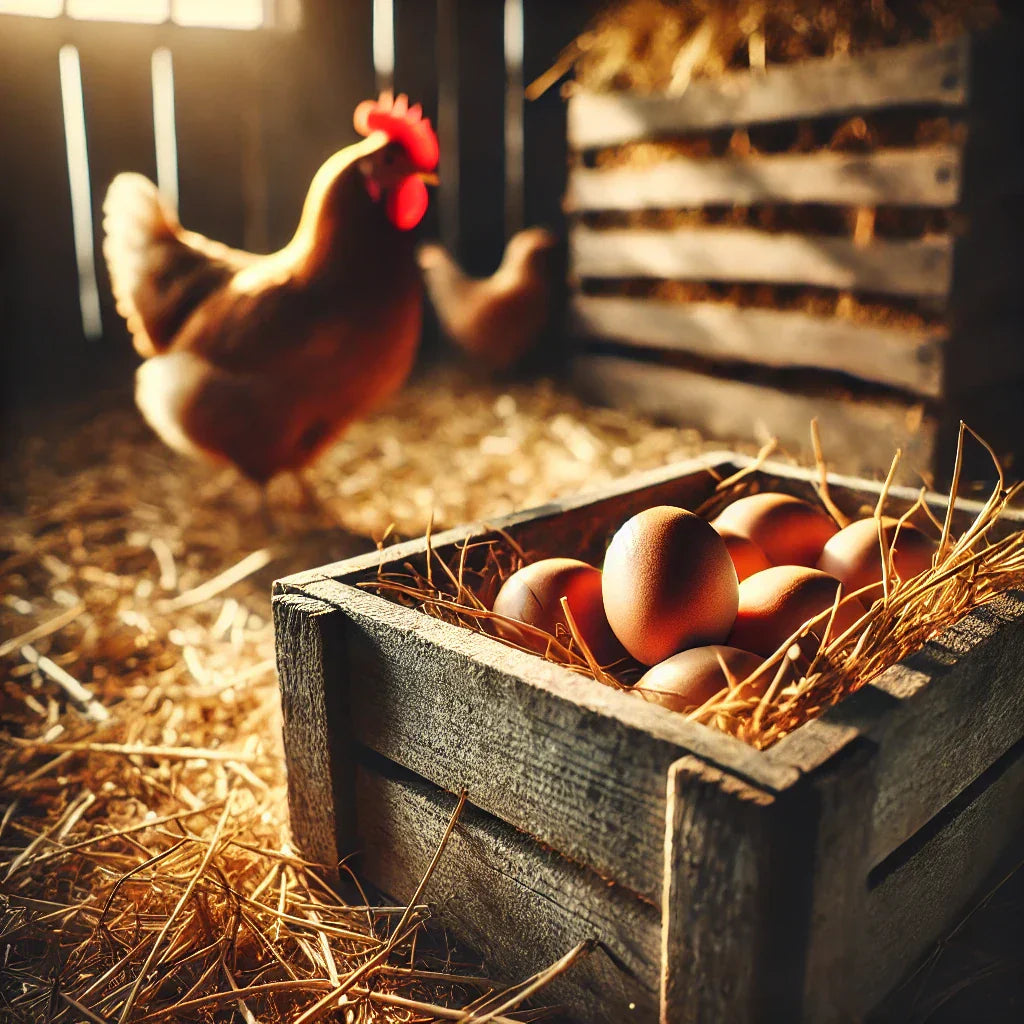Article: 10 Signs Your Chicken Might Be Sick (And What to Do About It)

10 Signs Your Chicken Might Be Sick (And What to Do About It)
Raising chickens in your backyard is not just about having fresh eggs on hand—it's about nurturing a flock of happy, healthy birds. But as any chicken keeper knows, chickens are expert camouflage artists when it comes to hiding signs of illness. It’s a survival trait honed in the wild to avoid predators, but for us chicken enthusiasts, it means trouble could be brewing without us realizing it.
By the time a chicken shows symptoms of illness, the condition might already be advanced. That’s why it’s crucial to know the early warning signs and how to address them effectively. Whether you're an urban homesteader or have a small farm, this guide will help you identify 10 common signs your chicken might be unwell—and show you ways to get them back to clucking happily.
1. Lethargy and Decreased Activity
A lively chicken is a healthy chicken. If you spot a hen or rooster lounging around excessively, not showing interest in food or water, or lacking its usual curiosity, it’s often a sign that something is amiss.
Possible Causes:
- Parasites like worms can sap their energy.
- Bacterial infections such as salmonellosis.
- Vitamin deficiencies, especially B12 or D3.
What to Do:
- Check their droppings for irregularities (such as worms or blood).
- Consult a vet about dewormers or antibiotics if needed.
- Boost nutrition by adding vitamin supplements to their diet.
2. Appetite Changes
Changing appetites are another red flag. Chickens are usually enthusiastic eaters, so meals left untouched or signs of selective eating could indicate illness.
Steps to Take:
- Inspect their crop for blockages or sour crop, which may cause discomfort when eating.
- Offer gentle foods like scrambled eggs or soaked pellets to entice them.
- If the issue continues for more than a day, consult a vet.
3. Respiratory Issues
Respiratory problems in chickens can range from mild to life-threatening. Look out for wheezing, rattling sounds, or swollen sinuses.
Action Steps:
- Opt for low-dust coop bedding like straw instead of shavings.
- Ensure proper ventilation in their housing without direct drafts.
- Use antibiotics as prescribed for respiratory infections.
Pro Tip: Adding apple cider vinegar to drinking water may help improve their respiratory health naturally.
4. Digestive Problems
Droppings tell a story. From watery diarrhea to oddly colored droppings, digestive issues often go hand-in-hand with infections or a poor diet.
Remedies:
- Ensure access to clean water and add electrolytes to prevent dehydration.
- Provide gut-supportive options such as plain yogurt or probiotic powders.
- For persistent cases, a vet can test for parasites and recommend treatments.
5. Egg Production Changes
If your hens are laying fewer eggs or producing eggs with strange textures or absence of shells, something might be wrong.
What to Do:
- Introduce calcium supplements like crushed oyster shells or feed with fortified calcium.
- Evaluate coop conditions—stress from predators or overcrowding can cause laying issues.
- Be on the lookout for signs of egg-binding, a serious condition where eggs get stuck.
6. Feather and Skin Irregularities
Healthy feathers and smooth skin are a chicken’s first defense against the environment. Bald spots, dull plumage, or irritated skin can signal trouble.
Treatment:
- Treat for mites or lice using poultry-safe insecticides or dusting powders like diatomaceous earth.
- Provide regular access to dust baths for natural pest control.
- Ensure a balanced, protein-rich diet to encourage feather regrowth.
7. Swelling and Inflammation
Swelling in areas like feet or eyes could point to infections or injuries. Bumblefoot, in particular, is a common issue in backyard flocks.
Steps to Take:
- For bumblefoot, clean the wound with antiseptic and wrap it with veterinary-grade bandages.
- If eyes are swollen, consider it a potential contagious infection and isolate the bird immediately.
- Seek vet attention for abscesses or unhealed wounds.
8. Behavioral Changes
Behavior changes, such as increased aggression or withdrawing from the group, could indicate stress, psychological discomfort, or even disease.
How to Respond:
- Provide space and resources to reduce competition (e.g., multiple feeders).
- Separate aggressive birds temporarily to discourage bullying.
- Address environmental stressors like predator threats or extreme weather changes.
Fun Fact: Chickens are highly social animals prone to stress when separated from their flock.
9. Abnormal Droppings
Unusual droppings can provide direct insight into a chicken’s health. Look for things like frothy, green, or bloody stools.
Diagnostic Steps:
- Collect stool samples and have them tested by a veterinarian.
- Keep your flock hydrated using electrolyte water.
- Apply deworming treatments when parasites are identified.
10. Neurological Symptoms
Signs like tremors, paralysis, or lack of coordination may point to serious conditions such as Marek’s disease or vitamin deficiencies.
What to Do:
- Quarantine the affected chicken to avoid spreading any contagious illnesses to the rest of the flock.
- Introduce vitamin-rich feed or supplements (e.g., thiamine for nerve function).
- Seek veterinary advice urgently for a definitive diagnosis and management plan.
How to Keep Your Flock Happy and Healthy
Caring for chickens requires a watchful eye, quick interventions, and proactive health management. By catching the early warning signs of illness, you can act swiftly and avoid larger problems down the line. Remember to:
- Regularly inspect each chicken for any abnormalities.
- Keep the coop clean, predator-proof, and well-ventilated.
- Provide fresh water, high-quality feed, and regular access to dust baths.
Want to Learn More?
For deeper dives into chicken wellness, upgraded coop designs, and sustainable poultry care, visit The Rustic Coop. Subscribe to our newsletter for exclusive tips and updates—your flock will thank you!
References
- Glisson, J. R., Hofacre, C. L., & Christensen, J. P. (2013). Diseases of Poultry (13th ed.). Wiley-Blackwell.
- Merck Veterinary Manual. (2025). Common Infectious Diseases in Backyard Poultry. https://merckvetmanual.com
- Jordan, F., Pattison, M., Alexander, D., & Faragher, T. (2001). Poultry Diseases (5th ed.). W.B. Saunders.


